Driver Surname Ancestry ResultsOur indexes 1000-1999 include entries for the spelling 'driver'. In the period you have requested, we have the following 720 records (displaying 111 to 120): Single Surname Subscription | | | Buying all 720 results of this search individually would cost £4,136.00. But you can have free access to all 720 records for a year, to view, to save and print, for £100. Save £4,036.00. More... |
These sample scans are from the original record. You will get scans of the full pages or articles where the surname you searched for has been found. Your web browser may prevent the sample windows from opening; in this case please change your browser settings to allow pop-up windows from this site. Wandsworth Baptisms
(1733)
The ancient parish of Wandsworth in Surrey comprised the single township of Wandsworth, including the hamlets of Garratt, Half Farthing and Summers Town. It lay in the archdeaconry of Surrey of the diocese of Winchester: unfortunately, few bishop's transcripts of Surrey parish registers survive earlier than 1800. Although the original parish registers of Wandsworth doubtless commenced in 1538, the volume(s) before 1603 had been lost by the 19th century. In 1889 a careful transcript by John Traviss Squire of the first three surviving registers was printed, and we have now indexed it year by year. The baptism registers from 1727 to 1774 normally give date of baptism, and the names of the child and its father and mother, but do not give date of birth.DRIVER. Cost: £2.00.  | Sample scan, click to enlarge
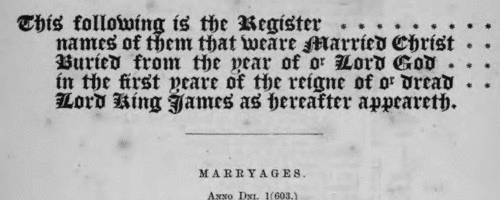
| Wandsworth Burials
(1733)
The ancient parish of Wandsworth in Surrey comprised the single township of Wandsworth, including the hamlets of Garratt, Half Farthing and Summers Town. It lay in the archdeaconry of Surrey of the diocese of Winchester: unfortunately, few bishop's transcripts of Surrey parish registers survive earlier than 1800. Although the original parish registers of Wandsworth doubtless commenced in 1538, the volume(s) before 1603 had been lost by the 19th century. In 1889 a careful transcript by John Traviss Squire of the first three surviving registers was printed, and we have now indexed it year by year. The early burial registers contain little detail - date of burial, and full name. For the burial of children, the father's name is also stated; for the burial of wives, the husband's. Such details as date or cause of death, age, address or occupation are almost never given. The burial registers are considerably more bulky than the baptism registers, because the burying ground was used by Dissenters, who formed a large part of the population. These include a French Protestant congregation that worshipped in a church (the registers of which do not survive) in a courtyard immediately opposite the parish church. The Quakers had a cemetery of their own. The 18th-century burial registers also include a surprising number of children sent out to Wandsworth from London to nurse.DRIVER. Cost: £4.00.  | Sample scan, click to enlarge
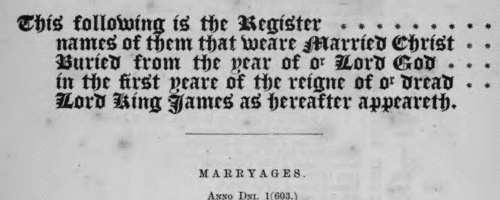
|  Masters and Apprentices
(1735) Masters and Apprentices
(1735)
Apprenticeship indentures and clerks' articles were subject to a 6d or 12d per pound stamp duty: the registers of the payments usually give the master's trade, address, and occupation, and the apprentice's father's name and address, as well as details of the date and length of the apprenticeship. 5 April to 31 December 1735DRIVER. Cost: £8.00.  | Sample scan, click to enlarge

|  Masters and Apprentices
(1736) Masters and Apprentices
(1736)
Apprenticeship indentures and clerks' articles were subject to a 6d or 12d per pound stamp duty: the registers of the payments usually give the master's trade, address, and occupation, and the apprentice's father's name and address, as well as details of the date and length of the apprenticeship. 2 January to 11 December 1736DRIVER. Cost: £8.00.  | Sample scan, click to enlarge

| Intended brides and grooms in East Sussex
(1670-1739)
Sussex was in the Diocese of Chichester, divided into two archdeaconries - Chichester for west Sussex, Lewes for the east. Both archdeaconries exercised active probate jurisdictions, and issued marriage licences. Those issued by Lewes Archdeaconry court in this period were recorded in a series of registers (E3, E4, E5 and E6), which were edited by Edwin H. W. Dunkin and published by the Sussex Record Society in 1907. Each entry gives the date of the licence, the full names of bride and groom, with parish for each, and often stating whether the bride was a widow or maiden. To obtain a licence it was necessary for the parties to obtain a bond, with two sureties. One of these was often the prospective husband; the other might be a relative or other respectable person. From the bonds the names of the sureties were also copied into the register, together with the name of the church at which the wedding was intended to take place. These details are usually given until 1701; thereafter sureties and intended church are usually omitted. One deanery in Lewes archdeaconry, that of South Malling, was an exempt jurisdiction (or peculiar) of the Archbishop of Canterbury, which had separate probate and issued its own marriage licences, also recorded in a series of registers. This volume also includes the contents of registers C1 to C6 of the Deanery of South Malling, for marriage licences from 1620 to 1732. The details recorded are as with the main series, similarly lacking names of sureties and intended church after 1721. South Malling deanery comprised the parishes of Edburton, Lindfield, Buxted, Framfield, Isfield, Uckfield, Mayfield, Wadhurst, Glynde, Ringmer, St Thomas at Cliffe, South Malling and Stanmer. DRIVER. Cost: £4.00.  | Sample scan, click to enlarge

| Army Officers
(1741)
'A General List, or Catalogue, Of all the Offices and Officers Employ'd In the several Branches of his Majesty's Government Ecclesiastical, Civil, Military, &c. In South-Britain, or England' gives the names (and often the annual salaries) of the government functionaries, civil servants, churchmen and military, systematically arranged section by section. Section 32 lists all the colonels, lieutenant-colonels and majors in his Majesty's troops of guards, grenadier guards, regiments of horse, dragoons and foot in Great Britain, followed by a list of all the colonels, lieutenant-colonels and majors in his Majesty's forces in Ireland, Minorca, Gibraltar, and in the Plantations (Leeward Islands, Placentia and Canso, Georgia, Jamaica, New York, Bermudas, and Providence).DRIVER. Cost: £6.00.  | Sample scan, click to enlarge
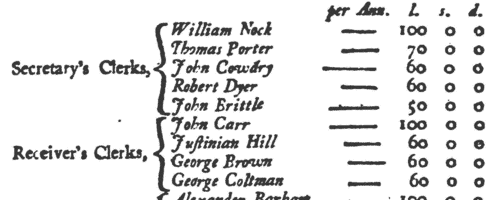
| The Royal Household
(1741)
'A General List, or Catalogue, Of all the Offices and Officers Employ'd In the several Branches of his Majesty's Government Ecclesiastical, Civil, Military, &c. In South-Britain, or England' gives the names (and often the annual salaries) of the government functionaries, civil servants, churchmen and military, systematically arranged section by section. Section 79 lists the King's Officers and Servants in Ordinary Above Stairs, under the Lord Chamberlain, including the Grooms of the Bedchamber, the Gentlemen of the Privy Chamber, Cup Bearers, Carvers, Gentlemen-Sewers, Gentlemen-Ushers of the Privy Chamber, Daily Waiters, Grooms of the Privy Chamber, Quarterly Waiters in Ordinary, Sewers of the Chamber, Pages of the Presence Chamber, Grooms of the Great Chamber, Coffer Bearers, Pages of the Bedchamber and Back Stairs, Officers in the Removing Wardrobe, Standing Wardrobe keepers, the Master of the Robes and his officials, the Waiters of the Robes, Laundress of the Body Linen, Sempstress, Starcher, Necessary Women, Treasurer and Comptroller of the Chamber, Master of the Jewel Office, Master of the Ceremonies, Serjeants-at-Arms, and a host of messengers, musicians, physicians, apothecaries and surgeons; together with the housekeepers for the various palaces, and other royal servants and officials throughout the realm.DRIVER. Cost: £6.00.  | Sample scan, click to enlarge
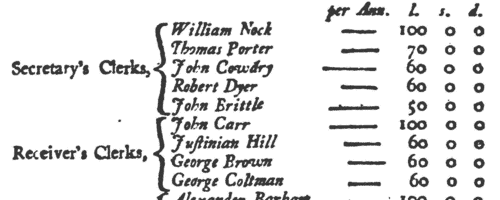
| Wandsworth Burials
(1741)
The ancient parish of Wandsworth in Surrey comprised the single township of Wandsworth, including the hamlets of Garratt, Half Farthing and Summers Town. It lay in the archdeaconry of Surrey of the diocese of Winchester: unfortunately, few bishop's transcripts of Surrey parish registers survive earlier than 1800. Although the original parish registers of Wandsworth doubtless commenced in 1538, the volume(s) before 1603 had been lost by the 19th century. In 1889 a careful transcript by John Traviss Squire of the first three surviving registers was printed, and we have now indexed it year by year. The early burial registers contain little detail - date of burial, and full name. For the burial of children, the father's name is also stated; for the burial of wives, the husband's. Such details as date or cause of death, age, address or occupation are almost never given. The burial registers are considerably more bulky than the baptism registers, because the burying ground was used by Dissenters, who formed a large part of the population. These include a French Protestant congregation that worshipped in a church (the registers of which do not survive) in a courtyard immediately opposite the parish church. The Quakers had a cemetery of their own. The 18th-century burial registers also include a surprising number of children sent out to Wandsworth from London to nurse.DRIVER. Cost: £4.00.  | Sample scan, click to enlarge
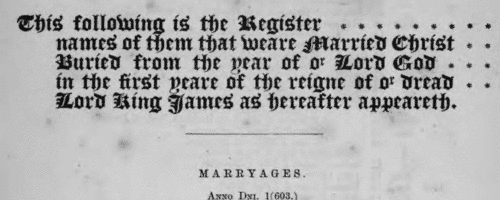
|  Masters and Apprentices
(1742) Masters and Apprentices
(1742)
Apprenticeship indentures and clerks' articles were subject to a 6d or 12d per pound stamp duty: the registers of the payments usually give the master's trade, address, and occupation, and the apprentice's father's name and address, as well as details of the date and length of the apprenticeship. 1 January to 31 December 1742DRIVER. Cost: £8.00.  | Sample scan, click to enlarge

|  Masters and Apprentices
(1743) Masters and Apprentices
(1743)
Apprenticeship indentures and clerks' articles were subject to a 6d or 12d per pound stamp duty: the registers of the payments usually give the master's trade, address, and occupation, and the apprentice's father's name and address, as well as details of the date and length of the apprenticeship. 1 January to 10 June 1743DRIVER. Cost: £8.00.  | Sample scan, click to enlarge

|
Research your ancestry, family history, genealogy and one-name study by direct access to original records and archives indexed by surname.
|













